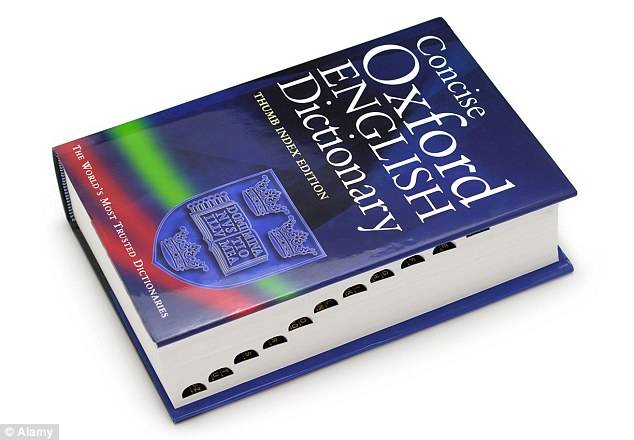
Perfection isn’t a human quality. In the article that follows, you will read the story of an error of omission committed by the Oxford English Dictionary, the world’s most authoritative English dictionary, which was corrected decades later. The article first appeared January 12, 2018 on the website Mentalfloss.com. The second article is a December 27, 2017 blog post from Cambridge Dictionary about common journalistic idioms. Enjoy:
By Lucas Reilly
When the complete edition of what would become the Oxford English Dictionary debuted in 1928, it was lauded as a comprehensive collection of the English language, a glossary so vast-and so thorough-that no other reference book could ever exceed its detail or depth. In total, the project took seven decades to catalogue everything from A to Z, defining a total of 414,825 words. But in the eyes of its editor James Murray, the very first volume of the dictionary was something of an embarrassment: It was missing a word.
Looking back, it’s impressive that more words were not lost. Assembling the OED was a nightmare. Before the first volume-an installment consisting of words beginning with the letters A and B-was published in 1888, multiple editors had taken (and abandoned) the helm, and each regime change created new opportunities for mayhem. When James Murray took command in 1879, the Oxford English Dictionary could best be defined by the word disarray.
The irony of making this massive reference book was that it required millions upon millions of tiny, tiny pieces of paper. Every day, volunteers mailed in thousands of small strips of paper called “quotation slips.” On these slips, volunteers would copy a single sentence from a book, in hopes that this sentence could help illuminate a particular word’s meaning. (For example, the previous sentence might be a good example of the word illuminate. Volunteers would copy that sentence and mail it to Oxford’s editors, who would review it and compare the slip to others to highlight the word illuminate.)
The process helped Oxford’s editors study all of the shades of meaning expressed by a single word, but it was also tedious and messy. With thousands of slips pouring into the OED’s offices every day, things could often go wrong.
And they did.
Some papers were stuffed haphazardly into boxes or bags, where they gathered cobwebs and were forgotten. Words beginning with Pa went missing for 12 years, only to be recovered in County Cavan, Ireland, where somebody was using the papers as kindling. Slips for the letter G were nearly burned with somebody’s trash. In 1879, the entire letter H turned up in Italy. At one point, Murray opened a bag only to find a family of live mice chewing on the paperwork.
When Murray took over, he tried to right the ship. To better organize the project, he built a small building of corrugated iron called the “Scriptorium.” It resembled a sunken tool shed, but it was here-with the help of 1029 built-in pigeonholes-that Murray and his subeditors arranged, sorted, and filed more than a thousand incoming slips every day. Millions of quotations would pass through the Scriptorium, and hundreds of thousands of words would be neatly organized by Murray’s trusty team.
One word, however, slipped through the cracks.
Bondmaid is not the kind of word people drop during conversation anymore, and that’s for the best: It means “a slave girl.” The word was most popular in the 16th century. Murray’s file for bondmaid, however, reached back even further: It included quotations as old as William Tyndale’s 1526 translation of the Bible.
But then bondmaid went missing. “Its slips had fallen down behind some books, and the editors had never noticed that it was gone,” writes Simon Winchester in The Meaning of Everything. When the first volume of the Oxford English Dictionary was published in 1888, bondmaid wasn’t there. (That volume of the OED does miss other words, but those exclusions were deliberate matters of editorial policy-bondmaid is the only word that the editors are known to have physically lost.)
When the slips were later rediscovered in the Scriptorium, Murray reportedly turned red with embarrassment. By 1901, some 14 years after the exclusion, he was still reeling over the mistake in a draft of a letter addressed to an anonymous contributor: “[N]ot one of the 30 people (at least) who saw the work at various stages between MS. and electrotyped pages noticed the omission. The phenomenon is absolutely inexplicable, and with our minute organization one would have said absolutely impossible; I hope also absolutely unparalleled.”
All was not lost for the lost word, however. In 1933, bondmaid made its Oxford dictionary debut. It had taken nearly five decades to make the correction.
Everyday idioms in newspapers
By Kate Woodford
Every few months, we read a selection of national newspapers published on the same day and highlight common idioms and phrases in their articles and reports. We read all sections of the papers – news, sports pages and gossip columns – and, as ever on this blog, we pick out the most useful, up-to-date idioms.
Starting with the tabloids, one paper reports that the government intends to put a tax on plastic packaging in the hope that it will ‘stem the tide’ of plastic junk in our countryside and oceans. To stem the tide of something unwanted is to stop it from increasing or spreading. Elsewhere in the same paper, it is reported that university students who openly support a particular political party are ‘being given the cold shoulder’ by their fellow students. To give someone the cold shoulder is to ignore them intentionally or be unfriendly to them. In the gossip pages, meanwhile, a columnist observes that the secret to a long and happy marriage is a determination to ‘stay the course’. To stay the course is to continue with something even through difficult times.
In another tabloid, it is claimed that one celebrity in a television dance contest has ‘fallen foul of’ another. To fall foul of someone is to have a disagreement with them. (You can also fall foul of a law or rule by unintentionally breaking it.) The same newspaper describes an actor who specializes in playing middle-aged men who ‘go off the rails’. To go off the rails is to start behaving badly.
A broadsheet, meanwhile, describes a ‘star-studded’ gathering of ‘well-heeled’ attendees. A party, film, etc. that is star-studded involves a lot of famous people. Someone who is well-heeled is rich. The same paper has a profile of the new editor of a famous magazine. It considers whether the newly appointed editor ‘has what it takes’ to ‘fill the shoes’ of the previous editor. To have what it takes is to have the qualities or the character to succeed at something and to fill someone’s shoes is to succeed in doing their old job satisfactorily. The same feature describes where the new editor ‘cut their editing teeth’ many years ago. To cut your political/professional, etc. teeth is to get your first experience of the type of job mentioned.

 Join Daily Trust WhatsApp Community For Quick Access To News and Happenings Around You.
Join Daily Trust WhatsApp Community For Quick Access To News and Happenings Around You.


